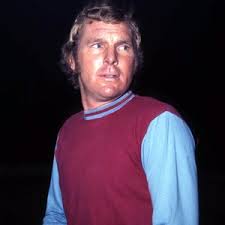Search My Football Facts & Stats
Web site designed & hosted by Paul Yarden © 2013 at Homestead™
098. Jack Charlton
Born into a famous footballing family, Jack Charlton played international football for England alongside his brother Bobby and enjoyed a long and distinguished playing career. After starting out in amateur football in his home town of Ashington, he was a one-club man loyal to Leeds United, he went on to a successful managerial career at club and international level.
Signing for Leeds in 1952, Charlton became a rock at the heart of the defence and played an important role in the club's promotion to the First Division in 1957. He received no international recognition early in his career and had to wait until shortly before his thirtieth birthday to make his debut for England, against Scotland in 1965. His international career was perfectly timed, as he played in every match in England's 1966 World Cup triumph.
In 1967 he replaced his brother Bobby as English Footballer of the Year, but real club success came even later in his career. Leeds won the Inter-Cities Fairs Cup in 1968, Charlton's first domestic honour, and the English League Championship followed a year later. Leeds won the Fairs Cup again in 1971 and the F.A. Cup in 1972, and the following year Charlton ended his playing career having made a club record 773 appearances.
Having retired from playing, Charlton became a manager, starting his coaching career with Middlesbrough in 1973 and took them into the top division of English football. Moving to Sheffield Wednesday in 1977, he repeated the feat of leading the club to promotion and in 1984, following a short spell back at Middlesbrough, took over at Newcastle United. Staying only one year, he left Newcastle in 1985 and a year later took on the job which would give him most success, as manager of the Republic of Ireland.
Ireland had never qualified for a major championship before Charlton took over, but in 1988 he led them into the European Championship in West Germany. Ireland were outsiders, but only a late Dutch goal prevented them from reaching the semi-finals. Charlton led Ireland to their first World Cup two years later, where they surprisingly reached the last eight before losing narrowly 1-0 to hosts Italy, and he also took them to the second round of the World Cup in the U.S.A. four years later. He retired in 1995 after failing to reach the 1996 European Championship, but remains by far Ireland's most successful manager.
Legendary Football Players - Jack Charlton
